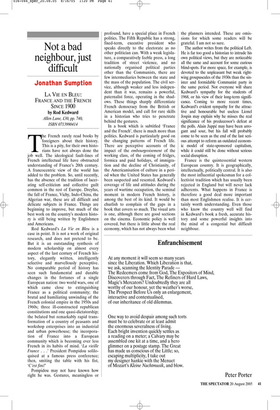Not a bad neighbour, just difficult
Jonathan Sumption
LA VIE EN BLEU: FRANCE AND THE FRENCH SINCE 1900 by Rod Kedward Allen Lane, £30, pp. 740, ISBN 0713990414 The French rarely read books by foreigners about their history. This is a pity, for their own historians have not always done the job well. The ideological fault-lines of French intellectual life have obstructed understanding of France’s 20th century. A francocentric view of the world has added to the problem. So, until recently, has the absence of the tradition of lacerating self-criticism and collective guilt common in the rest of Europe. Dreyfus, the fall of France, Vichy, Indo-China, the Algerian war, these are all difficult and delicate subjects in France. Things are beginning to improve, but much of the best work on the country’s modern history is still being written by Englishmen and Americans.
Rod Kedward’s La Vie en Bleu is a case in point. It is not a work of original research, and does not pretend to be. But it is an outstanding synthesis of modern scholarship on almost every aspect of the last century of French history, elegantly written, intelligently selective and marvellously perceptive. No comparable period of history has seen such fundamental and durable changes in the fortunes of a single European nation: two world wars, one of which came close to extinguishing France as a political community; the brutal and humiliating unwinding of the French colonial empire in the 1950s and 1960s; three ill-constructed republican constitutions and one quasi-dictatorship; the belated but remarkably rapid transformation of a country of peasants and workshop enterprises into an industrial and urban powerhouse; the incorporation of France into a European community which is becoming ever less French in its habits of mind. ‘La vieille France . . .’ President Pompidou soliloquised at a famous press conference; then, smiting the table with his fist, ‘C’est fini!’ Pompidou may not have known how right he was. Gestures, meaningless or profound, have a special place in French politics. The Fifth Republic has a strong, fixed-term, executive president who speaks directly to the electorate as no other politician can. With a weak legislature, a comparatively feeble press, a long tradition of street violence, and no nationally organised political parties other than the Communists, there are few intermediaries between the state and the mass of the population. The civil service, although weaker and less independent than it was, remains a powerful, paternalist force, operating in the shadows. These things sharply differentiate French democracy from the British or American model, and call for rare skills in a historian who tries to penetrate behind the gestures.
In a book which is subtitled ‘France and the French’, there is much more than politics. Kedward is particularly good on the changing patterns of French life. There are perceptive accounts of the impact of the embourgeoisement of the working class, of the coming of fridges, formica and paid holidays, of immigration and the decline of Christianity, of the Americanisation of culture in a period when the United States has generally been suspected and resented. Kedward’s coverage of life and attitudes during the years of wartime occupation, the seminal moment in modern French history, is among the best of its kind. It would be churlish to complain of the gaps in a book that covers so much. The visual arts is one, although there are good sections on the cinema. Economic policy is well covered, but there is little about the real economy, which has not always been what the planners intended. These are omissions for which some readers will be grateful. I am not so sure.
The author writes from the political Left. He is far too good a historian to intrude his own political views, but they are noticeable all the same and account for some curious blind-spots. Far more space, for example, is devoted to the unpleasant but weak rightwing groupuscules of the 1930s than the sinister and formidable Communist party in the same period. Not everyone will share Kedward’s sympathy for the students of 1968, or his view of their long-term significance. Coming to more recent times, Kedward’s evident sympathy for the attractive and honourable but useless Lionel Jospin may explain why he misses the real significance of his predecessor’s defeat at the polls. Alain Juppé may have been arrogant and sour, but his fall will probably come to be seen as the end of the last serious attempt to reform an outdated economic model of state-sponsored capitalism, while it could still be done without serious social disruption.
France is the quintessential western European country. It is geographically, intellectually, politically central. It is also the most influential spokesman for a collectivist tradition which has usually been rejected in England but will never lack adherents. What happens in France is therefore a good deal more important than most Englishmen realise. It is certainly worth understanding. Even those who know the country well will find in Kedward’s book a fresh, accurate history and some powerful insights into the mind of a congenial but difficult neighbour.

















































 Previous page
Previous page